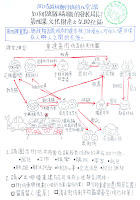
[green time stamp]
Waiting for Secretary at Dinner
the 19th day
8 lessons for Mrs Carrie Lam Cheng Yuet-ngor
How to be a good Secretary for Development
Lesson 2: People Oriented - Neighbours’ Rights
Check: The Urban Revitalization and Redevelopment Guidelines stated that, during redevelopment, the Government should consider the needs and interests of different stakeholders, and should not sacrifice any parties’ legal rights.
Exercise:
1. Neighbours’ Obligations include:
- serving the community
- concerning government policies
- stating their opinions
- communicating with the Government
Let’s think: Did the SSP neighbours fail to do any of the above? Please state below.
Ans:______________
2. Ah Keng (work and live in his garage): The government had never told me that redevelopment is for improving my life. I don’t want any solatium, I just want to stay here to live and work. But the government said there is no choice without any explanation.
Let’s think: According to the above case, what kind of his rights are being damaged? Please tick.
Ans: Right to maintain his life and work__
Right to know government policies__
Right to be involved in making government policies__
Right to choose his way of living__
3. Aunt Leung: I can’t understand the government documents
Let’s think: Compare the below examples, which one is easier for the neighbours to understand? Please tick.
Ans:
Government’s compensation booklet__
Compensation booklet redesigned by the neighbours__
















